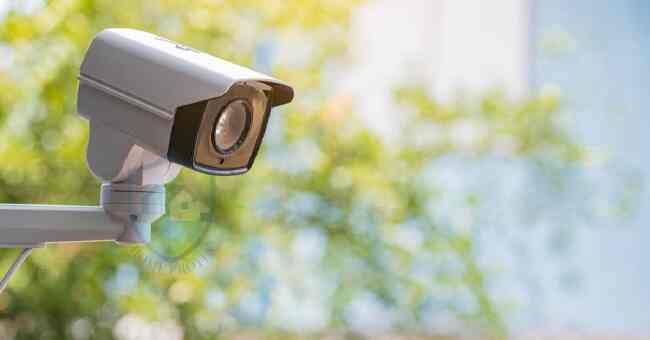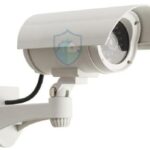Is recording audio on security camera illegal? Yes, the legality of recording audio on security cameras depends on the state and the situation.
I discovered the complex answer to this question firsthand when setting up a new surveillance system for my small business.
After reviewing some ambiguous online guidance, I installed cameras with audio recording enabled across my shop without fully understanding the consent laws involved.
It was only after a customer complained feeling uncomfortable that I realized my mistake.
While seeking to protect my business, I had unintentionally violated my patrons’ privacy rights and trust.
Through deeper research I soon learned the nuances around lawful and ethical audio policies.
My overbroad surveillance drove me to better educate myself. I hope my experience helps others understand the right way to approach audio recording on security cameras.
Overview
Security cameras have become ubiquitous in recent years. What started as purely video-based systems now increasingly incorporate high-quality audio recording capabilities as well.
This opens up extra functionality for surveillance and monitoring. However, it also creates complex legal issues given privacy laws around audio recording consent.
Many cheap, consumer-grade security cameras now come with built-in microphones and speakers.
This allows two-way communication as well as ambient audio monitoring. Higher-end systems feature sensitive directional microphones that can pick up crisp audio over long distances.
Police and government agencies also utilize audio recording surveillance equipment.
With audio-enabled security cameras, it’s easier than ever to record conversations and sounds without prior consent.
This understandably makes people uneasy. There is an ethical debate around whether audio monitoring crosses privacy boundaries, even in public spaces.
Additionally, the legalities get murky when it comes to audio recording on private property or during sensitive situations.
Laws regarding audio surveillance vary considerably by state. In some areas, only single-party consent is required, meaning the person operating the camera can record without notifying those being monitored.
However, other states mandate all-party consent, meaning permission must be granted from anyone whose voice could be picked up.
Federal wiretapping laws also come into play.
This article aims to provide clarity on the legal standing of audio recording using security cameras.
It will examine federal laws as well as consent requirements in different states.
Key contexts like public areas, private property, residences, conversations, and hidden cameras will be covered.
This will equip you with knowledge to operate audio surveillance equipment lawfully and ethically.
At the end, you’ll better understand best practices surrounding audio security cameras.
You’ll learn how to balance safety and monitoring needs with privacy rights.
The goal is to demystify the legal landscape so you can make informed choices if considering deploying this type of surveillance.
Let’s dive in and unpack the complex debate around audio recording consent laws and rights.
Is Recording Audio on Security Camera Illegal in Public Places?
When set up in public areas, security cameras with audio recording capabilities generally do not run afoul of the law.
This is because there is no inherent expectation of privacy when in public spaces.
Public places are areas accessible to all, like roads, sidewalks, parks, beaches, shopping malls, public transit, restaurants, and more.
These locations are open to anyone by default, not restricted by access controls.
As such, one cannot reasonably expect conversations and activities in public will be private.
Since there’s no expectation of privacy in public, audio recording via security cameras in these locations does not normally require consent under surveillance laws.
One party laws, which require just the consent of the person doing the recording, allow it.
Federal wiretapping laws also typically permit security camera audio recording in public.
Some specific examples of legal public place audio recording:
- A retail store owner installing security cameras with audio in their shop to deter theft and monitor employees.
- A city deploying audio-enabled traffic cameras to catch noise violations and aggressive driving at busy intersections.
- A park using audio cameras as part of a safety initiative to deter crime and monitor for security issues.
- Public transit authorities installing security cameras with microphones at stations and on buses to monitor safety and disputes.
- Beachfront businesses utilizing audio capable cameras to provide video and audio records in case of incidents.
- Security personnel monitoring live audio feeds from cameras covering public squares and sidewalks.
- Delivery drivers and ride sharing services recording interactions via in-vehicle cameras systems.
- Police body cams and dash cams recording audio during interactions with the public.
The above examples are generally legal and do not require consent from those being recorded audibly.
Of course, overt signs stating that recording is in progress are recommended. And there are some nuances around specifically targeting private conversations in public that should be avoided.
But in general, if the recording is open and straightforward security monitoring in a public space, no consent is needed.
There are exceptions like bathrooms and dressing rooms with heightened expectations of privacy.
But otherwise, audio surveillance in public is permissible from a legal standpoint, given the lowered privacy bar.
What About Recording Audio at Home or Business?
Audio recording on security cameras gets more legally complex on private property.
There is a higher reasonable expectation of privacy in private homes and businesses compared to public places.
As such, consent requirements for audio surveillance are stricter.
In a private home or apartment, tenants and residents have strong privacy protections against surveillance.
Secretly recording devices like hidden cameras with audio in private spaces is illegal in many cases without proper consent. Renters and homeowners both have claims to privacy from undue recording.
Likewise, employees have certain expectations of privacy at work from excessive monitoring by employers.
Private offices, break rooms, and other non-public workplace areas carry stronger privacy rights.
Indiscriminately recording audio in these spaces can violate wiretapping and eavesdropping laws.
However, the specific laws vary considerably by state when it comes to audio recording consent on private property:
Single Party Consent States
In many states, only one party has to consent to recording an in-person conversation.
This allows the person operating the security camera to lawfully record audio without the knowledge or permission of those being surveilled.
These “one party consent” laws authorize non-consensual recording.
Dual Party Consent States
Other states require two-party or all-party consent to record private conversations.
Here, express permission must be granted from everyone involved, even when recording security video. Failure to get full consent is illegal.
Workplace Laws
Extra rules apply in workplace contexts – some states require all-party consent to record employees, for example.
Federal regulations come into play too. Thorough review of labor laws is essential before deploying business security systems with audio functions.
Notification
While not always mandatory, providing clear notice that audio recording is taking place is advisable even in single party consent situations.
This puts those being monitored on proper notice even if formal consent isn’t required.
Home Security Systems
Audio recording capabilities on consumer home security systems make compliance with local laws critical.
Usage and access policies must align with regulations to avoid civil and criminal violations.
Overall, consent for audio recording on home or business security cameras requires careful consideration of state and federal standards.
Speaking with a qualified lawyer to understand local statutes is the safest approach before installing audio surveillance systems on private property.
While audio can provide useful security information, privacy rights on personal and commercial property make compliance crucial.
When is Recording Audio on Security Cameras Legal Without Consent?
While consent is required in many private audio recording situations, there are exceptions where capturing audio without permission may be lawful:
To Gather Evidence of Crimes
If security cameras with audio pick up footage of illegal acts like theft, assault, or vandalism, this can generally be used as evidence – even without consent from the perpetrators.
The audio component can provide crucial information for investigations and prosecutions.
Nanny Cams and Hidden Cameras
Secret recording devices like nanny cams and hidden security cameras are controversial but can sometimes be deemed legal if used appropriately in home or business settings.
These systems may record audio without consent for limited periods to gather evidence of misconduct.
Security Concerns
In circumstances where unauthorized audio recording is deemed necessary to provide boosted security, non-consensual taping may be justified.
But this exception is narrow – security issues like theft or liability risks may provide cause but wholesale secret monitoring is still prohibited.
Video Doorbells
Video doorbell cameras inherently record audio from visitors without getting express consent.
This is generally deemed legal as they only capture audio on the immediate exterior of a home in line with video monitoring. Interior audio recording is still restricted.
Covert Police Surveillance
Law enforcement agencies can sometimes obtain court approval for covert audio surveillance like wiretaps during investigations where deemed essential for gathering criminal evidence.
But these actions face heavy restrictions compared to consent exceptions for private citizens and businesses.
Public Figures
Recording conversations with prominent public figures like celebrities and politicians in public contexts may not require their direct consent in certain situations under journalism and free speech protections.
However, legal advice is still prudent.
Emergency Situations
Audio recording without consent may be arguably defensible in certain emergency scenarios where critical security, safety or health incidents must be documented – though this is still a grey area legally.
In limited cases, recording audio without explicit permission may be technically lawful.
But in general, consent requirements remain the norm for private spaces and conversations.
Furthermore, just because non-consensual recording is legally permitted does not always make it ethical.
Disabling audio functions where possible and clearly posting signage that audio monitoring occurs is recommended, even in flexible one-party consent states.
As technology expands, having policies that emphasize privacy rights is important.
Best Practices for Audio Recording on Security Cameras:
When utilizing audio-capable surveillance systems, following certain best practices can help maintain legal compliance and ethical practices:
Post Clear Signage
Prominently posting signs stating that video and audio recording is happening is strongly advised.
Even if not legally mandated, this provides visible notice and reinforces consent principles. Signs should be placed near security cameras and at entryways.
Disable Audio When Not Needed
Only enable audio recording functions when necessary – if constant ambient audio monitoring is not required, disable this option the rest of the time.
This shows intentions to minimize privacy impacts.
Regularly Review Laws
Regularly check state and federal recording regulations for any changes or updates that may be relevant.
Consult qualified attorneys to confirm compliance rather than relying on third-party guidance alone. Stay vigilant.
Limit Access
Tightly restrict which personnel can access live and recorded audio feeds to only those needing it for security duties.
This avoids misuse and supports privacy. Enable password protection and encryption.
Mute Audio Feeds
When live monitoring, mute audio feeds most of the time and only unmute when necessary to investigate specific incidents.
Don’t constantly listen to private conversations.
Beware Hidden Cameras
Utilize covert, hidden recording devices sparingly and only when clearly justified, like gathering evidence of crimes. Indiscriminate use violates public trust.
Curb 3rd Party Sharing
Be cautious of sharing audio recordings with other entities like law enforcement without considering privacy implications or confirming legal authority.
Short Data Retention
Avoid keeping audio recording data indefinitely. Have clear policies to automatically delete older feeds that are no longer needed as evidence. This reduces privacy risks of stored data.
Staff Training
Train staff on proper practices, respecting privacy, and only accessing/using feeds for authorized security purposes.
Ensure they understand responsibilities.
Usage Warnings
Verbal warnings can supplement signage. Politely informing people they are being recorded before sensitive conversations reinforces consent norms.
Ethics Review
Periodically review whether ongoing audio surveillance remains proportional, necessary for security purposes, and ethical.
Discontinue usage if no longer appropriate.
Legal Consultation
Seek guidance from qualified attorneys before deployment to discuss compliance, posting signage, disabling features, data access, and other best practices tailored to your specific circumstances.
Following these tips where applicable demonstrates an emphasis on lawfulness, transparency, necessity, proportionality and ethics when leveraging audio monitoring abilities.
The Ethics of Audio Recording on Security Cameras:
In addition to technical legal compliance, the ethics of recording audio with security cameras deserve consideration:
Weigh Privacy vs. Security
There is an ethical balancing act between amplifying security through audio surveillance versus infringing on privacy rights.
Extra monitoring provides more information but can feel invasive. Assess your specific risks and whether audio data would be proportionally beneficial.
Consider Necessity
Ask whether audio recording capability is truly needed to achieve your security goals.
Video footage often suffices for deterrence and evidence gathering. Make sure to disable audio collection when not actively needed.
Respect Privacy Zones
Even if legal, refrain from using audio tracking in hyper-private spaces like bathrooms, locker rooms, dressing rooms, and private offices. Ethically these deserve maximum privacy protections.
Tread Carefully with Hidden Mics
Covert, undisclosed recording devices like hidden microphones raise legal and ethical risks.
Use only as a last resort with compelling security need. And never improperly target private activities.
Review Regularly
Periodically conduct ethical reviews of your audio surveillance practices. Reassess whether ongoing monitoring remains necessary and proportionate to the situation. Be willing to evolve policies.
Transparency
Being transparent about audio monitoring policies, via signage and disclosure, assists ethical security practices.
Even if not required, clarity around recording supports consent principles.
Responsible Data Handling
Ethically, recorded audio data deserves security protections like encryption given sensitivity.
Strictly control access and avoid unauthorized sharing. Have responsible data retention and deletion policies.
Staff Conduct
Ensure staff tasked with monitoring understand ethical obligations in how they utilize and handle potentially sensitive audio recordings.
Minimize Monitoring
Don’t over-monitor or continuously listen live to all audio feeds. Mute recordings the majority of the time and listen selectively when needed to respect privacy.
Respond to Concerns
Take privacy complaints and concerns seriously. Be willing to engage in discussion and review monitoring policies.
Demonstrate consideration of community sentiment.
Consult Experts
If unsure about the ethics of your audio surveillance program, seek guidance from lawyers, ethicists, or community leaders to advise responsible practices.
Follow Golden Rule
Treat those under surveillance as you would wish to be treated if roles were reversed. Emphasize respect and minimize intrusion.
FAQs
How Do I Know If My Security Camera Records Audio?
Check product specs – audio ability will be listed. Look for a built-in microphone on the camera body.
See if there’s an audio setting in the camera software/app. Test recording and playback to confirm audio capture.
Is It Legal To Record Audio On Security Cameras In India?
Generally yes, but consent laws vary by state. Recommended to post signage about recording and consult an attorney regarding local laws. Disable audio recording when not necessary.
Is It Legal To Record Audio On Security Cameras In Canada?
Varies by province – some require single party consent, others require multi-party consent. Review provincial laws. Post signage and consult attorneys to ensure compliance.
What Type Of CCTV Has Audio?
Many modern security cameras have built-in microphones for audio monitoring – from video doorbells to surveillance systems. Advanced models utilize sensitive directional microphones. IP cameras often support audio.
How Do I Add Audio To My CCTV Camera?
Depends on system – may require new camera with audio features, connecting mic to camera, or installing central NVR system with audio ability and wiring mics. Professional installation recommended.
How Far Can CCTV Record Audio?
Depends on mic sensitivity – basic mics 15-25 feet, directional mics 50-100 feet. Environmental factors impact range too. High-end systems can potentially capture audio at distances of 300 feet or more.
What Is The Red Light On CCTV Camera?
The red light indicates the camera is actively recording video. This is required on security cameras in some regions so people know they are being filmed. Lack of a red light means the camera is not recording.
Are Audio Recording CCTV Legal In UK?
Yes but require consent under the The Data Protection Act 2018, Regulation of Investigatory Powers Act 2000.
Notice signs indicating recording mandated. Strict guidelines limit private/confidential conversation monitoring.
Is CCTV With Audio Recording Admissible In Court?
Potentially yes if obtained legally. Critical factors are proper consent, signage, chain of custody, relevance to the case. Illegally obtained recordings can be inadmissible. Experts recommend legal consultation.
What’s The Maximum Audio Recording Range For CCTV?
With standard mics audio recording typically 15-25 feet. More advanced directional mics under ideal conditions can potentially record conversational audio approximately 300 feet away. Environmental factors impact range.
Conclusion
In closing, it’s vital to remember that recording audio on security cameras has inherent privacy risks that call for careful handling.
While permissible in limited public settings, private spaces often carry consent requirements dependent on local laws.
Proper notice, proportional use, data protections, and regular review of monitoring practices are key.
If in doubt, consult qualified attorneys and disable unneeded audio functions to stay on firm ethical and legal ground.
With thoughtful policies, audio can assist security aims while respecting personal rights.




